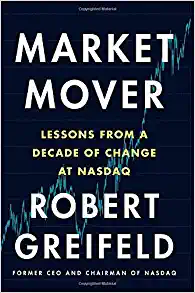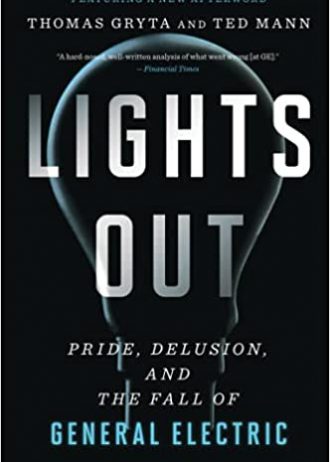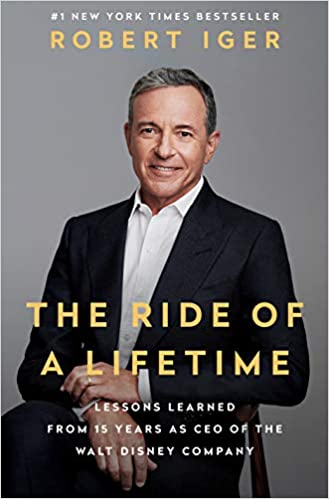Paperback


₦6,500.00
Market Movers
The former CEO and Chairman of Nasdaq shares insights and lessons learned from one of the world’s largest stock exchanges, detailing the company’s transformation from a fledgling U.S. equities market to a global financial technology company.
During 2003, the U.S. economy was described by one economist as “nervous, anxious, and waiting.” In December the Dow had topped 10,000 for the first time in a year and a half, and at year’s end the markets were up for the first time since 1999. But in the same year, American troops had moved into Iraq, and corporate boards were cutting CEOs at the slightest signs of trouble.
Amidst this turmoil Robert Greifeld, a former tech entrepreneur from outside the Wall Street bubble, became CEO of Nasdaq, a position he would hold for the next thirteen years. He saw the company through one of the most mercurial economic periods in history: the Bernie Madoff mega-scandal; Facebook’s tumultuous and disastrous IPO; Hurricane Sandy’s disruption of the world’s financial hub; the implosion of America’s housing market and the global economic crash that followed, from which we have yet to fully recover.
In Market Mover, Bob will write a first-hand account of the most critical moments of his career, with each chapter focusing on a headline-making event and ending with a prescriptive takeaway to impart to his readers.
Now Bob, who stepped aside as Nasdaq’s CEO at the end of 2016, is eager to look back at more than a decade of transformational change that occurred on his watch in order to share his insights and lessons with business readers.
Out of stock
Related products
Lights Out
₦10,000.00This is the definitive history of General Electric’s epic decline, as told by the two Wall Street Journal reporters who covered its fall.
Since its founding in 1892, GE has been more than just a corporation. For generations, it was job security, a solidly safe investment, and an elite business education for top managers.
GE electrified America, powering everything from lightbulbs to turbines, and became fully integrated into the American societal mindset as few companies ever had. And after two decades of leadership under legendary CEO Jack Welch, GE entered the twenty-first century as America’s most valuable corporation. Yet, fewer than two decades later, the GE of old was gone.
Lights Out examines how Welch’s handpicked successor, Jeff Immelt, tried to fix flaws in Welch’s profit machine, while stumbling headlong into mistakes of his own. In the end, GE’s traditional win-at-all-costs driven culture seemed to lose its direction, which ultimately caused the company’s decline on both a personal and organizational scale. Lights Out details how one of America’s all-time great companies has been reduced to a cautionary tale for our times.
Amazon Unbound: Jeff Bezos and the Invention of a Global Empire
₦12,000.00Almost ten years ago, Bloomberg journalist Brad Stone captured the rise of Amazon in his bestseller The Everything Store. Since then, Amazon has expanded exponentially, inventing novel products like Alexa and disrupting countless industries, while its workforce has quintupled in size and its valuation has soared to well over a trillion dollars. Jeff Bezos’s empire, once housed in a garage, now spans the globe. Between services like Whole Foods, Prime Video, and Amazon’s cloud computing unit, AWS, plus Bezos’s ownership of The Washington Post, it’s impossible to go a day without encountering its impact. We live in a world run, supplied, and controlled by Amazon and its iconoclast founder.
In Amazon Unbound, Brad Stone presents a deeply reported, vividly drawn portrait of how a retail upstart became one of the most powerful and feared entities in the global economy. Stone also probes the evolution of Bezos himself—who started as a geeky technologist totally devoted to building Amazon, but who transformed to become a fit, disciplined billionaire with global ambitions; who ruled Amazon with an iron fist, even as he found his personal life splashed over the tabloids.
Definitive, timely, and revelatory, Stone has provided an unvarnished portrait of a man and company that we couldn’t imagine modern life without.
The News Sorority
₦4,000.00For decades, women battered the walls of the male fortress of television journalism. After fierce struggles, three women—Diane Sawyer, Katie Couric, and Christiane Amanpour—broke into the newsroom’s once impenetrable “boys’ club.” These women were not simply pathbreakers, but wildly gifted journalists whose unique talents enabled them to climb to the top of the corporate ladder and transform the way Americans received their news.
Drawing on exclusive interviews with their colleagues and intimates from childhood on, The News Sorority crafts a lively and exhilarating narrative that reveals the hard struggles and inner strengths that shaped these women and powered their success. Life outside the newsroom—love, loss, child rearing—would mark them all, complicating their lives even as it deepened their convictions and instincts. Life inside the newsroom would include many nervy decisions and back room power plays previously uncaptured in any media account. Taken together, Sawyer’s, Couric’s, and Amanpour’s lives as women are here revealed not as impediments but as keys to their success.
Raised in Louisville, Kentucky, Diane Sawyer was a young woman steering her own unique political course in a time of societal upheaval. Her fierce intellect, almost insuperable work ethic, and sophisticated emotional intelligence would catapult Sawyer from being the first female on-air correspondent for 60 Minutes, to presenting anchoring the network flagship ABC World News. From her first breaks as a reporter all the way through her departure in 2014, Sawyer’s charisma and drive would carry her through countless personal and professional changes.
Katie Couric, always conveniently underestimated because of her “girl-next-door” demeanor, brazened her way through a succession of regional TV news jobs until she finally hit it big. In 1991, Couric became the cohost of Today, where, over the next fifteen years, she transformed the “female” slot from secondary to preeminent while shouldering devastating personal loss. Couric’s greatest triumph—and most bedeviling challenge—was at CBS Evening News, as the first woman to solo-anchor a nighttime network news program. Her contradictions—seriously feminist while proudly sorority-girlish—made her beyond easy typecasting, and as original as she is relatable.
A glamorous, unorthodox cosmopolite—raised in pre-revolution Iran amid royalty and educated in England—Christiane Amanpour would never have been picked out of a lineup as a future war reporter, until her character flourished on catastrophic soil: her family’s exile during the Iranian Revolution. Once she knew her calling, Amanpour shrewdly made a virtue of her outsider status, joining the fledgling CNN on the bottom rung and then becoming its “face,” catalyzing its rise to global prominence. Amanpour’s fearlessness in war zones would make her the world’s witness to some of its most acute crises and television’s chief advocate for international justice.
Revealing the tremendous combination of ambition, empathy, and skill that empowered Sawyer, Couric, and Amanpour to reach stardom, The News Sorority is a detailed story of three very particular lives and a testament to the extraordinary character of women everywhere.
The Ride of a Lifetime
₦15,000.00Robert Iger became CEO of The Walt Disney Company in 2005, during a difficult time. Competition was more intense than ever and technology was changing faster than at any time in the company’s history. His vision came down to three clear ideas: Recommit to the concept that quality matters, embrace technology instead of fighting it, and think bigger—think global—and turn Disney into a stronger brand in international markets.
Today, Disney is the largest, most admired media company in the world, counting Pixar, Marvel, Lucasfilm, and 21st Century Fox among its properties. Its value is nearly five times what it was when Iger took over, and he is recognized as one of the most innovative and successful CEOs of our era.
In The Ride of a Lifetime, Robert Iger shares the lessons he learned while running Disney and leading its 220,000-plus employees, and he explores the principles that are necessary for true leadership, including:
• Optimism. Even in the face of difficulty, an optimistic leader will find the path toward the best possible outcome and focus on that, rather than give in to pessimism and blaming.
• Courage. Leaders have to be willing to take risks and place big bets. Fear of failure destroys creativity.
• Decisiveness. All decisions, no matter how difficult, can be made on a timely basis. Indecisiveness is both wasteful and destructive to morale.
• Fairness. Treat people decently, with empathy, and be accessible to them.
This book is about the relentless curiosity that has driven Iger for forty-five years, since the day he started as the lowliest studio grunt at ABC. It’s also about thoughtfulness and respect, and a decency-over-dollars approach that has become the bedrock of every project and partnership Iger pursues, from a deep friendship with Steve Jobs in his final years to an abiding love of the Star Wars mythology.
The Man Who Knew
₦8,000.00Greenspan’s life is a quintessential American success story: raised by a single mother in the Jewish émigré community of Washington Heights, he was a math prodigy who found a niche as a stats-crunching consultant. A master at explaining the economic weather to captains of industry, he translated that skill into advising Richard Nixon in his 1968 campaign. This led to a perch on the White House Council of Economic Advisers, and then to a dazzling array of business and government roles, from which the path to the Fed was relatively clear. A fire-breathing libertarian and disciple of Ayn Rand in his youth who once called the Fed’s creation a historic mistake, Mallaby shows how Greenspan reinvented himself as a pragmatist once in power. In his analysis, and in his core mission of keeping inflation in check, he was a maestro indeed, and hailed as such. At his retirement in 2006, he was lauded as the age’s necessary man, the veritable God in the machine, the global economy’s avatar. His memoirs sold for record sums to publishers around the world.
But then came 2008. Mallaby’s story lands with both feet on the great crash which did so much to damage Alan Greenspan’s reputation. Mallaby argues that the conventional wisdom is off base: Greenspan wasn’t a naïve ideologue who believed greater regulation was unnecessary. He had pressed for greater regulation of some key areas of finance over the years, and had gotten nowhere. To argue that he didn’t know the risks in irrational markets is to miss the point. He knew more than almost anyone; the question is why he didn’t act, and whether anyone else could or would have. A close reading of Greenspan’s life provides fascinating answers to these questions, answers whose lessons we would do well to heed. Because perhaps Mallaby’s greatest lesson is that economic statesmanship, like political statesmanship, is the art of the possible. The Man Who Knew is a searching reckoning with what exactly comprised the art, and the possible, in the career of Alan Greenspan.







Reviews
There are no reviews yet.